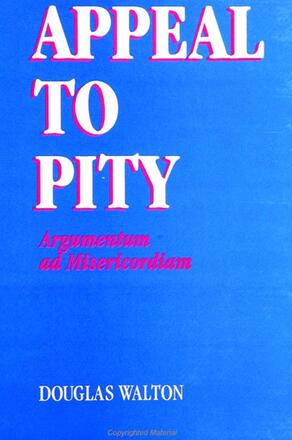
Appeal to Pity
Argumentum ad Misericordiam
Alternative formats available from:
A useful contribution to theories of argumentation and public address criticism, this book uses a pragmatic approach to understanding conversation as a way of elucidating the use of appeals to pity and sympathy.
Description
Appeal to pity has frequently been exploited with amazing success as a deceptive tactic of argumentation, so much so that it has traditionally been treated as a fallacy. Using a case study method, the author examines examples of appeals to pity and compassion in real arguments in order to classify, analyze, and evaluate the types of arguments used in these appeals. Among the cases studied are the controversial use of "poster kids" in the Jerry Lewis Telethon for Muscular Dystrophy and the "baby incubators story" deployed by a public relations firm to influence the decision to send U. S. forces into Kuwait during the Gulf War. In addition to the analyses of these and other case studies, this book provides, for the first time, precise guidelines and useful criteria with which to identify, analyze, and evaluate instances of the ad misericordiam argument.
Douglas Walton is Professor of Philosophy at the University of Winnipeg, Canada. He is the author of numerous books, including Plausible Argument in Everyday Conversation and Commitment in Dialogue: Basic Concepts of Interpersonal Reasoning, both published by SUNY Press, as well as Arguments from Ignorance; Argumentation Schemes for Presumptive Reasoning; A Pragmatic Theory of Fallacy; The Pace of Emotion in Argument; Slippery Slope Arguments; Begging the Question: Circular Reasoning as a Tactic of Argumentation; Practical Reasoning: Goal-Driven, Knowledge-Based, Action-Guiding Argumentation; and Informal Logic: A Handbook for Critical Argumentation.
Reviews
"Careful analyses are given of empathy, compassion, sympathy, and pity, and the differences between these. These analyses are useful for understanding the emotions, quite apart from an investigation of features of arguments. The analyses make it possible to distinguish arguments which contain an appeal to compassion from those containing an appeal to sympathy, and to further distinguish both of these appeals from the appeal to pity. Walton's discussion provides a sensitive and profound evaluation of arguments which occur frequently in daily life, but which are given only a superficial treatment in most texts. " — John Kearns, State University of New York at Buffalo